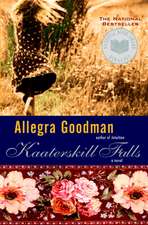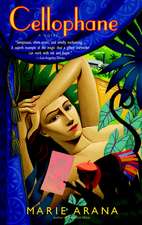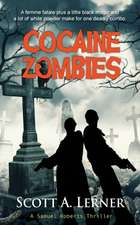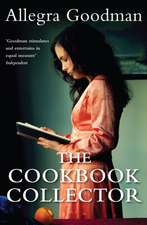Paradise Park
Autor Allegra Goodmanen Limba Engleză Paperback – 31 mar 2002
Abandoned by her folk-dancing partner, Gary, in a Honolulu hotel room, Sharon realizes she could return to Boston—and her estranged family—or listen to that little voice inside herself. The voice that asks: “How come Gary got to pursue his causes, while all I got to pursue was him?” Thus, with an open heart, a soul on fire, and her meager possessions (a guitar, two Indian gauze skirts, a macramé bikini, and her grandfather’s silver watch) Sharon begins her own spiritual quest. Ever the optimist, she is sure at each stage that she has struck it rich “spiritually speaking”—until she comes up empty. Then, in a karmic convergence of events, Sharon starts on the path home to Judaism. Still, even as she embraces her tradition, Sharon’s irrepressible self tugs at her sleeve. Especially when she meets Mikhail, falls truly in love at last, and discovers what even she could not imagine—her destiny.
Preț: 128.96 lei
Nou
Puncte Express: 193
Preț estimativ în valută:
24.68€ • 25.70$ • 20.86£
24.68€ • 25.70$ • 20.86£
Carte disponibilă
Livrare economică 17 februarie-03 martie
Preluare comenzi: 021 569.72.76
Specificații
ISBN-13: 9780385334181
ISBN-10: 0385334184
Pagini: 368
Dimensiuni: 133 x 209 x 21 mm
Greutate: 0.28 kg
Editura: Dial Press
ISBN-10: 0385334184
Pagini: 368
Dimensiuni: 133 x 209 x 21 mm
Greutate: 0.28 kg
Editura: Dial Press
Notă biografică
Allegra Goodman’s novels includeThe Chalk Artist, Intuition, The Cookbook Collector, Paradise Park,andKaaterskill Falls(a National Book Award finalist).Her fiction has appeared inThe New Yorker, Commentary, andPloughsharesand has been anthologized inThe O. Henry AwardsandBest American Short Stories.She has written two collections of short stories,The Family MarkowitzandTotal Immersionand a novel for younger readers,The Other Side of the Island.Her essays and reviews have appeared inThe New York Times Book Review, The Wall Street Journal, The New Republic, The Boston Globe, The Jewish Review of Books, andThe American Scholar.Raised in Honolulu, Goodman studied English and philosophy at Harvard and received a PhD in English literature from Stanford. She is the recipient of a Whiting Writer’s Award, the Salon Award for Fiction, and a fellowship from the Radcliffe Institute for Advanced study. She lives with her family in Cambridge, Massachusetts, where she is writing a new novel.
Extras
Honeycreepers
All this light was pouring in on me, and I started to open my eyes. I didn't know where in the world I was, and I reached over, but no one was there. The room was empty, and I didn't even know where the room was--it was all just floating in empty space, and I couldn't say what planet or star I'd landed on. All that was running through me in that one second was the loneliness of being this tiny insignificant particle in the universe, and how a life weighs nothing in all that light. And what is that light compared to God? Then I woke up and it came back to me.
That the guy, supposedly my boyfriend, who came out with me to this joint, a fleabag in Waikiki, was now gone, run off with a chick on her way to Fiji, and he--actually they--had left me with the hotel bill, which since I had no idea how to pay I was avoiding by just staying in the hotel and not checking out. But you know, the vision I had before, when I was just half awake, that was the important part. That was like the angels talking, when they speak to you and teach you right before you're born, and then they put their fingers on your lips--Sh! don't tell! You almost forget, but somewhere inside, you remember. At the time, that morning, I just lay there and had no idea what to do, not to mention I had never as far as I knew even believed in the existence of God. But in my subconscious, and my unconscious, and everywhere else, I had all these questions and ideas about this higher power and this divine spirit, and maybe I would have been dealing with them if I hadn't been so broke.
Finally I got up. I sat on the edge of the queen-size hotel bed. The bedspread was halfway off, sliding onto the floor, and the spread was green, printed yellow and orange with bird-of-paradise flowers so enormous they looked like some kind of dinosaur parts. The headboard was white rattan. So was the dresser and the mirror frame and the desk. There was no chair. Everything that could be nailed down was.
There I was all by myself, yet it wasn't exactly like I'd had some kind of one-night stand! We were folk dancers. That's how my boyfriend and I had met a couple of years before. Gary and I were two of the original dancers that danced in Cambridge at MIT. Balkan on Tuesdays. Israeli on Wednesdays. This was in the seventies when the folk scene in Boston was just starting, and there was a group of us--it was our life. We'd gather together at night--guys in cutoff shorts and girls in Indian gauze skirts, tank tops. In winter we'd strip down out of our parkas and ski hats and wool socks, and unzip until we were barefoot. I had long straight hair, light brown, and I wore it loose down to my waist, and I lived to dance in Walker Gym with my hair flying around me and my shirt against my bare skin, and the smooth gym varnish on the floor like syrup to my toes.
The music came from a tape recorder mounted on a little wooden cart painted gypsy colors, yellow and red, and stenciled in fancy green: mit folk dance club. The names of the dances were scribbled in chalk on a green chalkboard wheeled in from one of the classrooms. Then, from seven to eleven at night, we circled and wheeled and flew. We would dance like this for Balkan: twenty at a time together with our arms linked in a line, and our legs kicking and feet moving to rhythms like 7/8 or 11/16. Like this for Israeli: in concentric circles, feet flying, every other person off the ground.
Gary and I were such a pair that everybody watched us. When we left the gym it was like after a performance, all those admiring eyes. We'd walk outside in winter, and shuffle through the snow with the heat still on us, carrying our coats for blocks before we started to get cold. Just wandering in the slush and barely noticing that gradual little bit of freezing cold water that starts wicking in through the seams of your boots. We'd get home to Allston and run up the stairs to Gary's apartment--a real find on top of a doddering Victorian house. We had a kitchenette wired up in half a hall, and a dormer bedroom, where we curled up in blankets. I used to sit for hours in bed playing my guitar, the radiator like drums behind me, bang banging away.
Originally he was the one with the traveling bug. Gary was one of those Vietnam-era graduate students, thirty-five at that time, which was '74. He was still working on a government public health grant at Harvard, and he used to cart around boxes of those manila computer punch cards. Every once in a while the profs would fire up the old computer, and they'd input their data with a clicking and a clacking till the oracle spoke, spewing out numbers on that wide paper with pale-green and white stripes. Then Gary and the other grad students would all go back to their shared offices adorned with shag carpet remnants and cork bulletin boards, and they'd ponder the numbers. Gary had been doing this for years; and since it was a longitudinal study, which meant it didn't ever end, he was getting kind of restless.
But I, on the other hand, was really busy, since I was just twenty--in the middle of stopping out of college and getting seriously into dancing and my music--folk stuff on my guitar. I listened to Joni Mitchell and Carole King and Jackson Browne. And of course I was writing my own stuff, too, all in their same styles. I was biking over the BU Bridge to Central Square, where I was working for this antiwar, antinuclear couple, Vivica and Dan, who I'd met from dancing, and who had originally come from Berkeley. We were holed up, the three of us, in a little one-room office trying to put a stop to military spending. To me bringing peace about was pretty good. But Gary, being fifteen years older, had bigger ambitions for the planet. He started talking about how he wanted to go west.
The thing was I loved him. Not that he had a face to sink a thousand ships. He had fair skin, blinky brown eyes, shoulder-length hair, a Fu Manchu moustache. But he had beautiful feet, elastic arches. He had the longest arms of anyone I knew. And when he jumped! He could have been a pro. He could have traveled the world leaping in the air. That's the way I pictured it, him leaping and me spinning at his side. I still hadn't gotten over it, being so much younger than he was, and him choosing me to be his partner--because my dancing was so good. And getting to live with him, which meant getting out of my dad's house and my stepmother's hair. And just realizing that Gary thought I was beautiful! It wasn't like I was plain. I wasn't plain at all. I was slender and had big black eyes, sleepy with eyeliner, and that shimmery loose hair, so when I danced I looked like a ballerina down at the hem. But I was young--not even one-and-twenty like the guy in the poem--and I couldn't believe Gary with his long arms and his gorgeous feet and hard muscles in his calves actually thought that I was beautiful.
He had ideas about the environment and about the world and basically about cleaning up the oceans and saving the forests. He thought we'd go to Portland, Oregon, and fight the loggers and clean the rivers--finding big pipes sending poison into the fresh water--and we'd camp and explore all along the way. At that point in my life I was not much of a camper, and I'd never explored any strange places besides Cambridge. But I thought the oceans and the rivers were my causes too. And I knew Oregon wasn't far from Berkeley--and since the couple I worked for, Vivica and Dan, had always described Berkeley to me as nirvana, I figured we'd get to Oregon and then go downstream to Berkeley and I'd work there for a while and get my California residency and continue my education at the university and on the streets. So we went.
We drove a Plymouth Fury, a cursed lemon that sputtered and spit its way across the country and probably vomited as many pollutants as some of those companies Gary wanted to go after. Starting in January, taking I-80 west--by Toledo the transmission was shot. Just past Des Moines the fan belt slipped. Then through Iowa our muffler was dragging. We had a slow leak in our front driver-side tire, so half the time we were stopping at service stations for air. It was more like biking cross country than driving. We spent all our money on repairs, including some we didn't need. Those roadside mechanics looked at the two of us and my guitar in the back seat, and saw we were such a cliche we were begging to be ripped off. When we got out to the coast after three weeks, and we drove up to the Pacific Ocean, and we really saw it roaring all gray and restless in the rain, I almost cried with relief that there was nowhere else to go. We were stiff and filthy from sleeping in the car, from breaking down and hitching rides for help and getting towed and getting lied to. I really thought I'd seen it all.
We bummed around Oregon for a while and did some contra dancing in Portland. First I waitressed, and then I got a job cleaning rooms at a seniors residence--two twin towers with distant views of the Willamette River--and we lived there in some cement-block staff quarters in the back. I really really wanted to get to Berkeley, but Gary was going house to house for the Sierra Club. It was actually very old fashioned in a way, me scrubbing floors, and Gary like the Fuller brush man going door to door, peddling clean air and meadows blossoming with wildflowers. I started thinking it wasn't just a figure of speech, that you could die of loneliness.
Finally, after eight months or so, I convinced Gary to drive down to Berkeley and check out how activist the campus really was, and if the place was all it was cracked up to be. I was sure once he got there he'd want to stay, because it would all be so much his thing. I was just bereft of my bookstores and my coffeehouses and the folk dance club and little twisted streets in Boston, and I thought in his heart Gary was too.
We drove south, not right along the coast, but through the mountains on I-5, to take the faster route. We'd poured so much money into the Fury it was running for days without trouble, but we knew it was just a matter of time before that car broke down again. Mountains towered over us, all covered with pine trees, and desolate ranches came up, yellow bluffs and only cattle. Not a single rancher in sight. Then trucks would thunder down on either side of us and wall off the view. We broke the trip into two days and spent the night at a camping ground just outside Yreka, and then we drove through that little town, and past all the roadside dealerships for farm equipment, new and used. We drove all the next day, down, down, down, till the land was flat and we got to Vallejo, which was so flat it seemed to seep right into a blue haze at the edges, and then we got tangled in those steel bridges and highways that shoot out all over the bay.
What a relief! There was dancing every night in Berkeley, in the churches and the classrooms; and, since it was spring now, we'd dance practically all night in the parks on the grass. Gary and I danced until we hurt. We took razor blades to slit the blisters on our feet. The two of us showed off East Coast Israeli dances, steps Berkeley had never seen before. Everyone was talking about us. Everyone was gathering in circles in the evenings to watch us dance in Cedar Rose Park.
I spent my days working in Moe's, where the books were piled up on musty shelves and orange crates. I combed through the library closeouts, when the public libraries would dump books by the box load. Books in library bindings, all sensible colors like for ladies' winter purses: crimson, forest green, and navy blue. Between customers I used to stand around and read old tomes about Nature and Art. Books on microbes with black-and-white photographs, art-history textbooks with color plates--dark prints of oil paintings veiled with tissue-paper pages to protect them. Evenings, Gary and I went home to a vegetarian cooperative house of environmental people in South Berkeley where we slept on a futon high up under the roof. We had some silly weekends there in the house, dropping acid in the common room on these big vinyl sofas. But really mainly we were dedicated to turning people on to the plight of the marshlands around the bay. We had a ditto machine we had liberated from a basement office in Tollman Hall and we were busy putting out newsletters with that wavy lavender printing and trippy inky smell that dittos have.
Still, Gary had that traveling bug. "I want to go out and see some islands," he told me one night in bed.
And I said, "What kind of islands?"
"In the Pacific," he said. "I want to get out there before it's too late."
"Too late for what?" I said, being kind of sleepy.
"Before they're spoiled."
"I thought they already are spoiled."
"Did you know," he said, "that almost half of Hawaii's endemic birds are now extinct?" And he told me how forty percent of the known native bird species were now wiped out, and sixty percent, which I guess was all the rest, were on the endangered species list. And he told me how he wanted to go out there and see those birds, and work on saving them.
I lay there, my head in the hollow right beneath his shoulder. He was so big his whole body warmed me easily from head to foot. Being twenty, I figured I was past the escapades of my teenage years, and now settling down. I didn't want to go anywhere. I was something of a homebody for an activist.
All this light was pouring in on me, and I started to open my eyes. I didn't know where in the world I was, and I reached over, but no one was there. The room was empty, and I didn't even know where the room was--it was all just floating in empty space, and I couldn't say what planet or star I'd landed on. All that was running through me in that one second was the loneliness of being this tiny insignificant particle in the universe, and how a life weighs nothing in all that light. And what is that light compared to God? Then I woke up and it came back to me.
That the guy, supposedly my boyfriend, who came out with me to this joint, a fleabag in Waikiki, was now gone, run off with a chick on her way to Fiji, and he--actually they--had left me with the hotel bill, which since I had no idea how to pay I was avoiding by just staying in the hotel and not checking out. But you know, the vision I had before, when I was just half awake, that was the important part. That was like the angels talking, when they speak to you and teach you right before you're born, and then they put their fingers on your lips--Sh! don't tell! You almost forget, but somewhere inside, you remember. At the time, that morning, I just lay there and had no idea what to do, not to mention I had never as far as I knew even believed in the existence of God. But in my subconscious, and my unconscious, and everywhere else, I had all these questions and ideas about this higher power and this divine spirit, and maybe I would have been dealing with them if I hadn't been so broke.
Finally I got up. I sat on the edge of the queen-size hotel bed. The bedspread was halfway off, sliding onto the floor, and the spread was green, printed yellow and orange with bird-of-paradise flowers so enormous they looked like some kind of dinosaur parts. The headboard was white rattan. So was the dresser and the mirror frame and the desk. There was no chair. Everything that could be nailed down was.
There I was all by myself, yet it wasn't exactly like I'd had some kind of one-night stand! We were folk dancers. That's how my boyfriend and I had met a couple of years before. Gary and I were two of the original dancers that danced in Cambridge at MIT. Balkan on Tuesdays. Israeli on Wednesdays. This was in the seventies when the folk scene in Boston was just starting, and there was a group of us--it was our life. We'd gather together at night--guys in cutoff shorts and girls in Indian gauze skirts, tank tops. In winter we'd strip down out of our parkas and ski hats and wool socks, and unzip until we were barefoot. I had long straight hair, light brown, and I wore it loose down to my waist, and I lived to dance in Walker Gym with my hair flying around me and my shirt against my bare skin, and the smooth gym varnish on the floor like syrup to my toes.
The music came from a tape recorder mounted on a little wooden cart painted gypsy colors, yellow and red, and stenciled in fancy green: mit folk dance club. The names of the dances were scribbled in chalk on a green chalkboard wheeled in from one of the classrooms. Then, from seven to eleven at night, we circled and wheeled and flew. We would dance like this for Balkan: twenty at a time together with our arms linked in a line, and our legs kicking and feet moving to rhythms like 7/8 or 11/16. Like this for Israeli: in concentric circles, feet flying, every other person off the ground.
Gary and I were such a pair that everybody watched us. When we left the gym it was like after a performance, all those admiring eyes. We'd walk outside in winter, and shuffle through the snow with the heat still on us, carrying our coats for blocks before we started to get cold. Just wandering in the slush and barely noticing that gradual little bit of freezing cold water that starts wicking in through the seams of your boots. We'd get home to Allston and run up the stairs to Gary's apartment--a real find on top of a doddering Victorian house. We had a kitchenette wired up in half a hall, and a dormer bedroom, where we curled up in blankets. I used to sit for hours in bed playing my guitar, the radiator like drums behind me, bang banging away.
Originally he was the one with the traveling bug. Gary was one of those Vietnam-era graduate students, thirty-five at that time, which was '74. He was still working on a government public health grant at Harvard, and he used to cart around boxes of those manila computer punch cards. Every once in a while the profs would fire up the old computer, and they'd input their data with a clicking and a clacking till the oracle spoke, spewing out numbers on that wide paper with pale-green and white stripes. Then Gary and the other grad students would all go back to their shared offices adorned with shag carpet remnants and cork bulletin boards, and they'd ponder the numbers. Gary had been doing this for years; and since it was a longitudinal study, which meant it didn't ever end, he was getting kind of restless.
But I, on the other hand, was really busy, since I was just twenty--in the middle of stopping out of college and getting seriously into dancing and my music--folk stuff on my guitar. I listened to Joni Mitchell and Carole King and Jackson Browne. And of course I was writing my own stuff, too, all in their same styles. I was biking over the BU Bridge to Central Square, where I was working for this antiwar, antinuclear couple, Vivica and Dan, who I'd met from dancing, and who had originally come from Berkeley. We were holed up, the three of us, in a little one-room office trying to put a stop to military spending. To me bringing peace about was pretty good. But Gary, being fifteen years older, had bigger ambitions for the planet. He started talking about how he wanted to go west.
The thing was I loved him. Not that he had a face to sink a thousand ships. He had fair skin, blinky brown eyes, shoulder-length hair, a Fu Manchu moustache. But he had beautiful feet, elastic arches. He had the longest arms of anyone I knew. And when he jumped! He could have been a pro. He could have traveled the world leaping in the air. That's the way I pictured it, him leaping and me spinning at his side. I still hadn't gotten over it, being so much younger than he was, and him choosing me to be his partner--because my dancing was so good. And getting to live with him, which meant getting out of my dad's house and my stepmother's hair. And just realizing that Gary thought I was beautiful! It wasn't like I was plain. I wasn't plain at all. I was slender and had big black eyes, sleepy with eyeliner, and that shimmery loose hair, so when I danced I looked like a ballerina down at the hem. But I was young--not even one-and-twenty like the guy in the poem--and I couldn't believe Gary with his long arms and his gorgeous feet and hard muscles in his calves actually thought that I was beautiful.
He had ideas about the environment and about the world and basically about cleaning up the oceans and saving the forests. He thought we'd go to Portland, Oregon, and fight the loggers and clean the rivers--finding big pipes sending poison into the fresh water--and we'd camp and explore all along the way. At that point in my life I was not much of a camper, and I'd never explored any strange places besides Cambridge. But I thought the oceans and the rivers were my causes too. And I knew Oregon wasn't far from Berkeley--and since the couple I worked for, Vivica and Dan, had always described Berkeley to me as nirvana, I figured we'd get to Oregon and then go downstream to Berkeley and I'd work there for a while and get my California residency and continue my education at the university and on the streets. So we went.
We drove a Plymouth Fury, a cursed lemon that sputtered and spit its way across the country and probably vomited as many pollutants as some of those companies Gary wanted to go after. Starting in January, taking I-80 west--by Toledo the transmission was shot. Just past Des Moines the fan belt slipped. Then through Iowa our muffler was dragging. We had a slow leak in our front driver-side tire, so half the time we were stopping at service stations for air. It was more like biking cross country than driving. We spent all our money on repairs, including some we didn't need. Those roadside mechanics looked at the two of us and my guitar in the back seat, and saw we were such a cliche we were begging to be ripped off. When we got out to the coast after three weeks, and we drove up to the Pacific Ocean, and we really saw it roaring all gray and restless in the rain, I almost cried with relief that there was nowhere else to go. We were stiff and filthy from sleeping in the car, from breaking down and hitching rides for help and getting towed and getting lied to. I really thought I'd seen it all.
We bummed around Oregon for a while and did some contra dancing in Portland. First I waitressed, and then I got a job cleaning rooms at a seniors residence--two twin towers with distant views of the Willamette River--and we lived there in some cement-block staff quarters in the back. I really really wanted to get to Berkeley, but Gary was going house to house for the Sierra Club. It was actually very old fashioned in a way, me scrubbing floors, and Gary like the Fuller brush man going door to door, peddling clean air and meadows blossoming with wildflowers. I started thinking it wasn't just a figure of speech, that you could die of loneliness.
Finally, after eight months or so, I convinced Gary to drive down to Berkeley and check out how activist the campus really was, and if the place was all it was cracked up to be. I was sure once he got there he'd want to stay, because it would all be so much his thing. I was just bereft of my bookstores and my coffeehouses and the folk dance club and little twisted streets in Boston, and I thought in his heart Gary was too.
We drove south, not right along the coast, but through the mountains on I-5, to take the faster route. We'd poured so much money into the Fury it was running for days without trouble, but we knew it was just a matter of time before that car broke down again. Mountains towered over us, all covered with pine trees, and desolate ranches came up, yellow bluffs and only cattle. Not a single rancher in sight. Then trucks would thunder down on either side of us and wall off the view. We broke the trip into two days and spent the night at a camping ground just outside Yreka, and then we drove through that little town, and past all the roadside dealerships for farm equipment, new and used. We drove all the next day, down, down, down, till the land was flat and we got to Vallejo, which was so flat it seemed to seep right into a blue haze at the edges, and then we got tangled in those steel bridges and highways that shoot out all over the bay.
What a relief! There was dancing every night in Berkeley, in the churches and the classrooms; and, since it was spring now, we'd dance practically all night in the parks on the grass. Gary and I danced until we hurt. We took razor blades to slit the blisters on our feet. The two of us showed off East Coast Israeli dances, steps Berkeley had never seen before. Everyone was talking about us. Everyone was gathering in circles in the evenings to watch us dance in Cedar Rose Park.
I spent my days working in Moe's, where the books were piled up on musty shelves and orange crates. I combed through the library closeouts, when the public libraries would dump books by the box load. Books in library bindings, all sensible colors like for ladies' winter purses: crimson, forest green, and navy blue. Between customers I used to stand around and read old tomes about Nature and Art. Books on microbes with black-and-white photographs, art-history textbooks with color plates--dark prints of oil paintings veiled with tissue-paper pages to protect them. Evenings, Gary and I went home to a vegetarian cooperative house of environmental people in South Berkeley where we slept on a futon high up under the roof. We had some silly weekends there in the house, dropping acid in the common room on these big vinyl sofas. But really mainly we were dedicated to turning people on to the plight of the marshlands around the bay. We had a ditto machine we had liberated from a basement office in Tollman Hall and we were busy putting out newsletters with that wavy lavender printing and trippy inky smell that dittos have.
Still, Gary had that traveling bug. "I want to go out and see some islands," he told me one night in bed.
And I said, "What kind of islands?"
"In the Pacific," he said. "I want to get out there before it's too late."
"Too late for what?" I said, being kind of sleepy.
"Before they're spoiled."
"I thought they already are spoiled."
"Did you know," he said, "that almost half of Hawaii's endemic birds are now extinct?" And he told me how forty percent of the known native bird species were now wiped out, and sixty percent, which I guess was all the rest, were on the endangered species list. And he told me how he wanted to go out there and see those birds, and work on saving them.
I lay there, my head in the hollow right beneath his shoulder. He was so big his whole body warmed me easily from head to foot. Being twenty, I figured I was past the escapades of my teenage years, and now settling down. I didn't want to go anywhere. I was something of a homebody for an activist.
Recenzii
“Clear, rain-washed prose ...In Allegra Goodman's ebullient, bittersweet, plaintive Song of Sharon, the heroine’s true achievement is finding poetry in.becoming who she’s been all along.”
—The New York Times Book Review
“[The] narrator, that Sharon Spiegelman, has one of the most enchanting, idiosyncratic voices since Augie March.”
—The Washington Post Book World
“With Sharon Spiegelman, Goodman has created a Huck Finn for the modern age, drifting down the river of American spirituality.”
—The Christian Science Monitor
“Like Saul Bellow and Philip Roth before her, Goodman has achieved a breakthrough book.”
—Time
—The New York Times Book Review
“[The] narrator, that Sharon Spiegelman, has one of the most enchanting, idiosyncratic voices since Augie March.”
—The Washington Post Book World
“With Sharon Spiegelman, Goodman has created a Huck Finn for the modern age, drifting down the river of American spirituality.”
—The Christian Science Monitor
“Like Saul Bellow and Philip Roth before her, Goodman has achieved a breakthrough book.”
—Time
Descriere
With an open heart, a soul on fire, and her meager possessions, Sharon Spiegelman begins a hilarious 20-year quest for enlightenment. But each time she believes she has struck spiritual gold she comes up empty when her irrepressible self shines through. NPR sponsorship.








